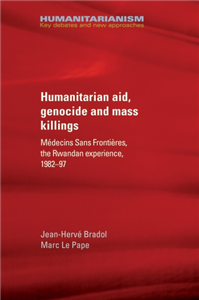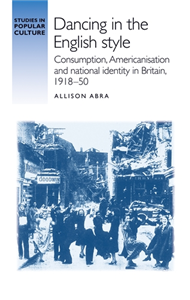Your Search Results
-
Promoted ContentPolitical ideologiesMay 2017
Neoliberal power and public management reforms
by Professor Peter Triantafillou. Series edited by Mark Haugaard
This book examines the links between major contemporary public sector reforms and neoliberal thinking. The key contribution of the book is to enhance our understanding of contemporary neoliberalism as it plays out in the public administration and to provide a critical analysis of generally overlooked aspects of administrative power. The book examines the quest for accountability, credibility and evidence in the public sector. It asks whether this quest may be understood in terms of neoliberal thinking and, if so, how? The book makes the argument that while current administrative reforms are informed by several distinct political rationalities, they evolve above all around a particular form of neoliberalism: constructivist neoliberalism. The book analyses the dangers of the kinds of administrative power seeking to invoke the self-steering capacities of society and administration itself.
-
Promoted ContentPhilosophy: epistemology & theory of knowledgeJune 2017
Critical theory and epistemology
The politics of modern thought and science
by Anastasia Marinopoulou. Series edited by Darrow Schecter
This volume in the Critical Theory and Contemporary Society series explores the arguments between critical theory and epistemology in the twentieth and twenty-first centuries. Focusing on the first and second generations of critical theorists and Luhmann's systems theory, the book examines how each approaches epistemology. It opens by looking at twentieth-century epistemology, particularly the concept of lifeworld (Lebenswelt). It then moves on to discuss structuralism, poststructuralism, critical realism, the epistemological problematics of Foucault's writings and the dialectics of systems theory. This unique work takes a comparative look at structuralism and post-structuralism's epistemological theory with special reference to scientific reason. It also investigates Luhmann's works in epistemology. The aim is to explore whether the focal point for epistemology and the sciences remain that social and political interests actually form a concrete point of concern for the sciences as well.
-
 Trusted Partner
African historyJanuary 2017
Trusted Partner
African historyJanuary 2017Humanitarian aid, genocide and mass killings
Médecins Sans Frontières, the Rwandan experience, 1982–97
by Jean-Hervé Bradol. Series edited by Bertrand Taithe
Throughout the 1990s, Médecins Sans Frontières (MSF) was forced to face the challenges posed by the genocide of Rwandan Tutsis and a succession of outbreaks of political violence in Rwanda and its neighbouring countries. Humanitarian workers were confronted with the execution of almost one million people, tens of thousands of casualties pouring into health centres, the flight of millions of people who had sought refuge in camps and a series of deadly epidemics. Drawing on various hitherto unpublished private and public archives, this book recounts the experiences of the MSF teams working in the field. It is intended for humanitarian aid practitioners, students, journalists and researchers with an interest in genocide and humanitarian studies and the political sociology of international organisations.
-
 Trusted Partner
Theatre studiesMarch 2017
Trusted Partner
Theatre studiesMarch 2017Performance art in Eastern Europe since 1960
by Amy Bryzgel. Series edited by Marsha Meskimmon
-
 Trusted Partner
SociologyJanuary 2017
Trusted Partner
SociologyJanuary 2017Sport in the Black Atlantic
Cricket, Canada and the Caribbean diaspora
by Janelle Joseph. Series edited by John Horne
This book outlines the ways sport helps to create transnational social fields that interconnect migrants dispersed across a region known as the Black Atlantic: England, North America and the Caribbean. Many Caribbean men's stories about their experiences migrating to Canada, settling in Toronto, finding jobs and travelling involved some contact with a cricket and social club. This book offers a unique contribution to black diaspora studies through showing sport as a means of allaying the pain of ageing in the diaspora, creating transnational social networks and marking ethnic boundaries on a local scale. The book also brings black diaspora analysis to sport research, and through a close look at what goes on before, during and after cricket matches provides insights into the dis-unities, contradictions and complexities of Afro-diasporic identity in multicultural Canada. It will be of interest to students and scholars in sociology, sport studies and black diaspora studies.
-
 Trusted Partner
Literature: history & criticismMay 2017
Trusted Partner
Literature: history & criticismMay 2017Three sixteenth-century dietaries
by Joan Fitzpatrick. Series edited by Susan Cerasano
Early modern dietaries are prose texts recommending the best way to maintain physical and psychological well-being. Three sixteenth-century dietaries contains Thomas Elyot's Castle of Health, Andrew Boorde's Compendious Regiment and William Bullein's Government of Health, all popular and influential works that were typical of a genre advising the reader on how best to maintain physical and psychological health. They are here introduced, contextualized and edited for the first time in a modern spelling edition. Introductory material explores the dietary genre, its relationship to humanism, humoral theory, and the wide range of authorities with which the dietary authors engaged. The volume includes an examination of the bibliographical and publication history of each work, comprehensive explanatory notes and appendices that provide prefaces to earlier editions, a glossary, and a list of authorities and works cited or alluded to in the dietaries.
-
 Trusted Partner
Children's & YAApril 2024
Trusted Partner
Children's & YAApril 2024Smart Pickings
2nd Edition
by Lynne Bianchi
Smart Pickings (2nd Edition) further engages young readers with the world of science. It promotes talk between children, their classmates, teachers, parents, family and friends. The book introduces a range of diverse and inspirational scientists who have or are making a difference through their innovations and research. A book to encouraging us all to wonder, ask questions and ask 'Who are they?', 'How might I be like them?'
-
 Trusted Partner
Individual film directors, film-makersFebruary 2017
Trusted Partner
Individual film directors, film-makersFebruary 2017Julien Duvivier
by Series edited by Robert Ingram, Ben McCann
This book is the first ever English-language study of Julien Duvivier (1896-1967), once considered one of the world's great film filmmakers. It provides new contextual and analytical readings of his films that identify his key themes and techniques, trace patterns of continuity and change, and explore critical assessments of his work over time. His career began in the silent era and ended as the French New Wave was winding down. In between, Duvivier made over sixty films in a long and at times difficult career. He was adept at literary adaptation, biblical epic, and film noir, and this groundbreaking volume illustrates in great detail Duvivier's eclecticism, technical efficiency and visual fluency in works such as Panique (1946) and Voici le temps des assassins (1956). It will particularly appeal to scholars and students of French cinema looking for examples of a director who could straddle the realms of the popular and the auteur.
-
 Trusted Partner
Modern history to 20th century: c 1700 to c 1900May 2017
Trusted Partner
Modern history to 20th century: c 1700 to c 1900May 2017Inventing the cave man
From Darwin to the Flintstones
by Andrew Horrall. Series edited by Jeffrey Richards
Fred Flintstone lived in a sunny Stone Age American suburb, but his ancestors were respectable, middle-class Victorians. They were very amused to think that prehistory was an archaic version of their own world because it suggested that British ideals were eternal. In the 1850s, our prehistoric ancestors were portrayed in satirical cartoons, songs, sketches and plays as ape-like, reflecting the threat posed by evolutionary ideas. By the end of the century, recognisably human cave men inhabited a Stone Age version of late-imperial Britain, sending-up its ideals and institutions. Cave men appeared constantly in parades, civic pageants and costume parties. In the early 1900s American cartoonists and early Hollywood stars like Charlie Chaplin and Buster Keaton adopted and reimagined this very British character, cementing it in global popular culture. Cave men are an appealing way to explore and understand Victorian and Edwardian Britain.
-
 Trusted Partner
Trusted Partner
-
 Trusted Partner
Colonialism & imperialismJanuary 2015
Trusted Partner
Colonialism & imperialismJanuary 2015An Anglican British world
by Joseph Hardwick. Series edited by Andrew S. Thompson, John Mackenzie
-
 Trusted Partner
Trusted Partner
-
 Trusted Partner
Sociology & anthropologyFebruary 2017
Trusted Partner
Sociology & anthropologyFebruary 2017Environment, labour and capitalism at sea
'Working the ground' in Scotland
by Penny McCall Howard. Series edited by Alexander Smith
This book explores how fishers make the sea productive through their labour, using technologies ranging from wooden boats to digital GPS plotters to create familiar places in a seemingly hostile environment. It shows how their lives are affected by capitalist forces in the markets they sell to, forces that shape even the relations between fishers on the same boat. Fishers frequently have to make impossible choices between safe seamanship and staying afloat economically, and the book describes the human impact of the high rate of deaths in the fishing industry. The book makes a unique contribution to understanding human-environment relations, examining the places fishers create and name at sea, as well as technologies and navigation practices. It combines phenomenology and political economy to offer new approaches for analyses of human-environment relations and technologies. It contributes to the social studies of fisheries through an analysis of how deeply fishing practices and social relations are shaped by political economy. It will be read in universities by social scientists and anthropologists and also by those with an interest in maritime Scotland.
-
 Trusted Partner
Plays, playscriptsNovember 2016
Trusted Partner
Plays, playscriptsNovember 2016The Tragedy of Antigone, The Theban Princesse
by Thomas May
by Edited by Matteo Pangallo. Series edited by Paul Dean
Thomas May's The Tragedy of Antigone (1631), edited by Matteo Pangallo, is the first English treatment of the story made famous by Sophocles. This edition contains a facsimile of the copy held at the Beinecke Library of Yale University, making the play commercially available for the first time since its original publication. The extensive introduction discusses, among other things, the ownership history of existing copies and their marginal annotations, and of the play's topical political implications in the light of May's wavering between royalist and republican sympathies. Writing during the contentious early years of Charles I's reign, May used Sophocles' Antigone to explore the problems of just rule and justified rebellion. He also went beyond the scope of the original, adding content from a wide range of other classical and contemporary plays, poems and other sources, including Shakespeare's Romeo and Juliet and Macbeth. This volume will be essential reading for advanced students, researchers and teachers of early English drama and seventeenth-century political history.
-
 Trusted Partner
History of medicineMay 2017
Trusted Partner
History of medicineMay 2017Leprosy and colonialism
Suriname under Dutch rule, 1750–1950
by Stephen Snelders. Series edited by Professor Keir Waddington
Leprosy and colonialism investigates the history of leprosy in Suriname within the context of Dutch colonial power and racial conflict, from the plantation economy and the age of slavery to its legacy in the modern colonial state. It explores the relationship between the modern stigmatization and exclusion of people affected with leprosy, and the political tensions and racial fears originating in colonial slave society, exerting their influence until after the decolonization up to the present day. In the book colonial sources are read from shifting perspectives, of the colonial rulers and, 'from below', the ruled. Though leprosy is today a neglected tropical disease, recognizing influences of our colonial heritage in our global management of health and disease, and exploring the perspectives of other cultures are essential in a time in which migration movements make the permeability of boundaries, and transmission of diseases, more common then perhaps ever before.
-
 Trusted Partner
Literature: history & criticismSeptember 2016
Trusted Partner
Literature: history & criticismSeptember 2016Spenserian allegory and Elizabethan biblical exegesis
A context for The Faerie Queene
by Series edited by J. B. Lethbridge, Margaret Christian
Edmund Spenser famously conceded to his friend Walter Raleigh that his method in The Faerie Queene 'will seeme displeasaunt' to those who would 'rather have good discipline delivered plainly in way of precepts, or sermoned at large'. Spenser's allegory and Elizabethan biblical exegesis is the first book-length study to clarify Spenser's comparison by introducing readers to the biblical typologies of contemporary sermons and liturgies. The result demonstrates that 'precepts ... sermoned at large' from lecterns and pulpits were themselves often 'clowdily enwrapped in allegoricall devises'. In effect, routine churchgoing prepared Spenser's first readers to enjoy and interpret The Faerie Queene. A wealth of relevant quotations invites readers to adopt an Elizabethan mindset and encounter the poem afresh. The 'chronicle history' cantos, Florimell's adventures, the Souldan episode, Mercilla's judgment on Duessa and even the two stanzas that close the Mutabilitie fragment, all come into sharper focus when juxtaposed with contemporary religious rhetoric.
-
 Trusted Partner
Art & design styles: BaroqueOctober 2016
Trusted Partner
Art & design styles: BaroqueOctober 2016The matter of miracles
Neapolitan baroque architecture and sanctity
by Series edited by Amelia Jones, Helen Hills, Marsha Meskimmon
This book investigates baroque architecture through the lens of San Gennaro's miraculously liquefying blood in Naples. This vantage point allows a bracing and thoroughly original rethink of the power of baroque relics and reliquaries. It shows how a focus on miracles produces original interpretations of architecture, sanctity and place which will engage architectural historians everywhere. The matter of the baroque miracle extends into a rigorous engagement with natural history, telluric philosophy, new materialism, theory and philosophy. The study will transform our understanding of baroque art and architecture, sanctity and Naples. Bristling with new archival materials and historical insights, this study lifts the baroque from its previous marginalisation to engage fiercely with materiality and potentiality and thus unleash baroque art and architecture as productive and transformational.
-
 Trusted Partner
Literature: history & criticismFebruary 2017
Trusted Partner
Literature: history & criticismFebruary 2017The Gothic and death
by Series edited by Elisabeth Bronfen. Edited by Carol Davison
The Gothic and death offers the first ever published study devoted to the subject of the Gothic and death across the centuries. It investigates how the multifarious strands of the Gothic and the concepts of death, dying, mourning and memorialisation ('the Death Question') - have intersected and been configured cross-culturally to diverse ends from the mid-eighteenth century to the present day. Drawing on recent scholarship in such fields as Gothic Studies, film theory, Women's and Gender Studies and Thanatology Studies, this interdisciplinary collection of fifteen essays by international scholars combines an attention to socio-historical and cultural contexts with a rigorous close reading of works, both classic and lesser known. This area of enquiry is considered by way of such popular and uncanny figures as corpses, ghosts, zombies and vampires, and across various cultural and literary forms such as Graveyard Poetry, Romantic poetry, Victorian literature, nineteenth-century Italian and Russian literature, Anglo-American film and television, contemporary Young Adult fiction and Bollywood film noir.
-
 Trusted Partner
HistoryApril 2017
Trusted Partner
HistoryApril 2017Dancing in the English style
Consumption, Americanisation, and national identity in Britain, 1918–50
by Allison Abra. Series edited by Jeffrey Richards
Dancing in the English style explores the development, experience, and cultural representation of popular dance in Britain from the end of the First World War to the early 1950s. It describes the rise of modern ballroom dancing as Britain's predominant popular style, as well as the opening of hundreds of affordable dancing schools and purpose-built dance halls. It focuses in particular on the relationship between the dance profession and dance hall industry and the consumers who formed the dancing public. Together these groups negotiated the creation of a 'national' dancing style, which constructed, circulated, and commodified ideas about national identity. At the same time, the book emphasizes the global, exploring the impact of international cultural products on national identity construction, the complexities of Americanisation, and Britain's place in a transnational system of production and consumption that forged the dances of the Jazz Age.
-
 Trusted Partner
Sociology: family & relationshipsJuly 2016
Trusted Partner
Sociology: family & relationshipsJuly 2016Changing gender roles and attitudes to family formation in Ireland
by Series edited by Rob Kitchin, Margret Fine-Davis
Recent decades have witnessed major changes in gender roles and family patterns, as well as a falling birth rate in Ireland and the rest of Europe. While the traditional family is now being replaced in many cases by new family forms, we do not know the reasons why people are making the choices they are and whether or not these choices are leading to greater well-being. While demographic research has attempted to explain the new trends in family formation and fertility, there has been little research on people's attitudes to family formation and having children. This book presents the results of the first major study to examine people's attitudes to family formation and childbearing in Ireland. Based on a nationwide representative sample of 1,404 men and women in the childbearing age group, the study was carried out against a backdrop of changing gender role attitudes and behaviour as well as significant demographic change.

























